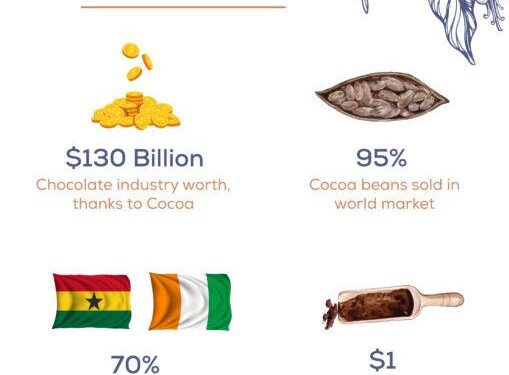As the European Union’s deadline for cocoa traceability approaches, Cameroon is on the brink of achieving a significant milestone in its agricultural sector. Known for its rich, high-quality cocoa, the nation has been working diligently to enhance its traceability systems, ensuring that cocoa products can be tracked from farm to market. This advancement is critical not only for compliance with emerging international standards but also for addressing consumer concerns about sustainability and ethical sourcing. However, despite these promising developments, challenges loom large, threatening to undermine Cameroon’s progress. Issues such as inadequate infrastructure, inconsistent farmer participation, and the looming impact of climate change pose significant risks to the country’s cocoa industry. As policymakers, farmers, and stakeholders navigate this complex landscape, the outcome will have lasting implications for both Cameroon’s economy and its position in the global cocoa market.
Cocoa Traceability in Cameroon Advances Amid EU Regulations but Faces Implementation Challenges
The push for cocoa traceability in Cameroon has gained momentum as producers work diligently to comply with new European Union regulations aimed at enhancing transparency in the chocolate supply chain. Key stakeholders, including farmers, cooperatives, and exporters, have made significant strides in establishing a framework that allows for the tracking of cocoa beans from their origin to the final product. This initiative is fueled by the rising demand from consumers for ethically sourced products and the EU’s commitment to combatting deforestation and promoting sustainable practices. As a result, many companies are now implementing systems that leverage technology, such as blockchain, to ensure comprehensive documentation of each step in the cocoa production process.
Despite the progress made, several challenges remain that could hinder the successful implementation of traceability systems. Issues such as inadequate infrastructure, limited access to technology, and insufficient training for farmers can impede the accuracy and efficiency of data collection. Furthermore, the economic pressures faced by smallholder farmers often lead them to prioritize immediate financial returns over long-term sustainability efforts. Addressing these challenges is critical for Cameroon not only to meet the approaching EU deadline but also to enhance its reputation in the global cocoa market. Key considerations include:
- Investment in infrastructure: Improving roads and communication networks to facilitate better access to remote farming areas.
- Technology adoption: Promoting tools that assist farmers in recording and tracking their production data.
- Education and training: Providing farmers with the necessary knowledge to implement sustainable practices and use new technologies effectively.
Key Insights on Sustainable Practices for Cocoa Farmers to Meet EU Standards
The transition to sustainable practices in cocoa farming is critical as Cameroon works towards full traceability, especially with impending EU regulations. To remain competitive and compliant, cocoa farmers must adopt methods that ensure environmental protection and social responsibility. Key strategies include:
- Agroforestry Integration: Combining cocoa with other crops and trees can promote biodiversity and reduce the impact of pests, enhancing soil health.
- Organic Farming Techniques: Utilizing organic fertilizers and natural pest control can improve product quality while avoiding detrimental chemicals.
- Water Conservation Practices: Implementing efficient irrigation systems can safeguard valuable water resources in cocoa production areas.
- Community Training Programs: Educating farmers on sustainable practices fosters a culture of shared responsibility and innovation within communities.
Moreover, the establishment of traceability systems is integral to ensuring that cocoa products meet EU standards. This involves:
| Traceability Aspect | Importance |
|---|---|
| Source Verification | Ensures ethical sourcing and compliance with sustainability certifications. |
| Supply Chain Monitoring | Enables transparency and accountability across all stages of cocoa production. |
| Digital Record Keeping | Facilitates efficient tracking of cocoa from farm to market, enhancing traceability. |
By integrating these sustainable practices and robust traceability mechanisms, Cameroon can strengthen its position in the global cocoa market while aligning itself with the stringent environmental and ethical standards set by the European Union.
Recommendations for Strengthening Supply Chain Transparency and Risk Mitigation in Cocoa Production
To enhance supply chain transparency and mitigate risks within cocoa production, stakeholders must prioritize the adoption of advanced technology and collaborative frameworks. Blockchain technology can offer a robust solution by providing a secure and immutable record of transactions, ensuring that every step of the cocoa supply chain is visible and verifiable. Governments and private sector organizations should encourage the development of mobile applications that allow farmers to register their cocoa production and receive real-time updates on market trends and pricing. This not only increases farmers’ access to vital information but also fosters trust between producers and consumers.
Furthermore, fostering partnerships between local cooperatives and international brands will play a pivotal role in strengthening supply chain integrity. Initiatives should focus on capacity building for farmers, enabling them to adhere to sustainable practices that meet both local and international standards. Regular audits and assessments should be implemented to identify potential risks in the supply chain and promote compliance with ethical sourcing guidelines. To facilitate transparency, a streamlined communication system is essential, where stakeholders can easily share insights and updates regarding cocoa sourcing and sustainability efforts.
In Summary
In conclusion, as Cameroon approaches the deadline for enhanced cocoa traceability set by the European Union, the nation stands at a pivotal juncture. While advancements in tracking systems and collaborative efforts among stakeholders signal progress towards transparency in the cocoa sector, challenges remain steadfast. Issues such as inadequate infrastructure, limited farmer education, and socio-political factors continue to pose significant risks. As the country intensifies its efforts to secure compliance with international standards, the success of these initiatives will not only impact local economies but also shape Cameroon’s reputation in the global cocoa market. The coming months will be crucial as stakeholders work to navigate these complexities and ensure that the promise of traceability translates into real benefits for farmers and consumers alike.














